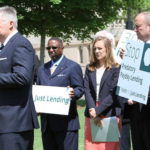Shariah ban unconstitutional. Oklahoma's referendum that would prohibit courts from considering Islamic law is unconstitutional, the 10th U.S. Circuit Court of Appeals ruled, upholding a lower court decision that had blocked the measure. The ruling could affect more than 20 other states where laws against Shariah are under consideration. The three-judge panel dismissed assertions by lawyers for Oklahoma that the law did not discriminate against Muslims, noting the amendment specifically mentions Shariah law. About 70 percent of Oklahoma voters approved the referendum in November 2010. Last year, a U.S. district court judge in Oklahoma City found the ban unconstitutional and issued a temporary injunction preventing it from taking effect. The case now returns to the district court in Oklahoma, which is expected to issue a permanent injunction against the law. If Oklahoma Attorney General Scott Pruitt decides to appeal that case, it would return to the appeals court and could eventually be heard by the Supreme Court.
Unbelief grows in Britain. Christians in England and Wales are losing ground about as fast as nonbelievers are gaining it, a new government-sponsored poll reveals. The British government's latest Citizenship Survey reports that in the five years leading up to 2010, the percentage of declared Christians in the region dropped by 7 percent, although they nonetheless held solid at 70 percent. Meanwhile, the total of those declaring no religion climbed by 6 percent, to 21 percent over the same period, the poll indicated. The survey found Christians were more than half as likely as Muslims, Sikhs and Hindus to practice their religion. But religious practice grew among Muslims, from 73 percent in 2005 to 79 percent in 2009-10. The latest poll was based on questionnaires answered by 10,000 men and women, including 5,000 Muslims and other minorities.
Judge rules against breakaway Episcopal parishes. Seven congregations that broke with the Episcopal Church in 2006 over its policies on homosexuality are not entitled to keep parish property estimated to be worth millions, a Virginia judge ruled. The ruling by Fairfax County Judge Randy Bellows reverses his 2008 decision and hands a major victory to the Episcopal Church and the Diocese of Virginia, which had fought to keep the property. In 2010, the Virginia Supreme Court ruled Bellows misapplied a state law that allows some breakaway congregations to keep parish property and sent the case back for reconsideration. The congregations said they will consider appealing. Since leaving the Episcopal Church, the seven congregations have joined the Anglican Church in North America, which is seeking recognition as an official branch of the worldwide Anglican Communion. Under Episcopal Church law, property owned by any member congregation, parish or mission is held in trust for the national denomination. Citing that provision, secular courts generally have ruled against breakaway parishes that have split from the Episcopal Church since it elected an openly gay bishop in 2003.
—Compiled from Religion News Service














We seek to connect God’s story and God’s people around the world. To learn more about God’s story, click here.
Send comments and feedback to Eric Black, our editor. For comments to be published, please specify “letter to the editor.” Maximum length for publication is 300 words.